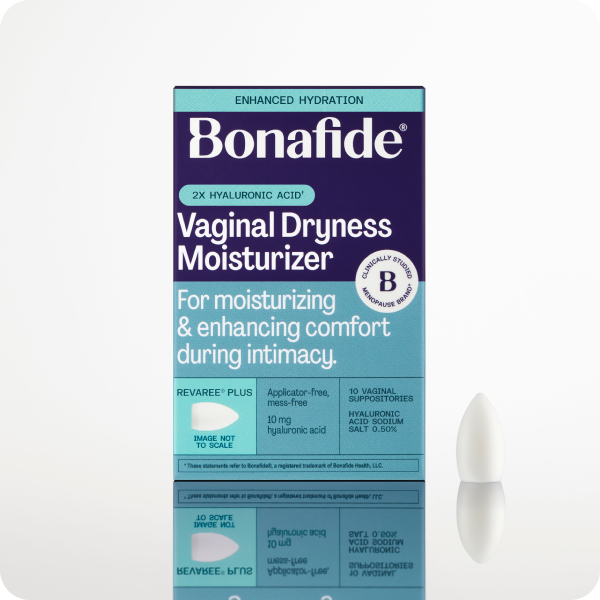Genitourinary syndrome of menopause (GSM), and its associated set of symptoms, affects more than half of postmenopausal women, yet it is a condition that still remains underdiagnosed and undertreated.1
So, what exactly is this prevalent and stigmatized but underrecognized syndrome—and is there treatment for it? Here, Chief Bonafide Medical Officer, Dr. Alyssa Dweck, provides insights into what genitourinary syndrome of menopause is and what women can do to recognize, treat, and seek help for the symptoms.
What Is Genitourinary Syndrome of Menopause?
Genitourinary syndrome of menopause is a relatively new medical term used to describe a set of symptoms associated with menopause that affect the vagina, vulva, and genitourinary organs.2
This updated medical terminology refers to a condition that, if left untreated, may worsen over time. “GSM symptoms, formally referred to as VVA, or vulvovaginal atrophy, are chronic and progressive without management,” says Dr. Dweck.
Genitourinary Syndrome of Menopause Symptoms
Genitourinary syndrome of menopause symptoms include vaginal dryness, painful sex, and, sometimes, a frequent “urge to go” symptoms that may interfere with aspects of your everyday life. According to medical experts, vulvar atrophy associated with genitourinary syndrome of menopause may cause pain when sitting or walking, while urinary frequency and urgency can contribute to sleep disruptions.3
These effects, in addition to a potentially strained sex life (due to vaginal atrophy), may negatively impact your romantic relationships as well as other areas of your life.
Common symptoms of GSM, according to Dr. Dweck and other medical experts, include: 4
- Vaginal and/or vulva dryness
- Vaginal sensitivity
- Irritation
- Itching
- Inelasticity
- Change in scent
- Painful sex
- Increase in urinary frequency or urgency
- Difficulty experiencing orgasm
- Decreased libido
- Recurrent urinary infections
- Painful urination
- Pelvic pain
Dr. Dweck adds that lesser known symptoms, like bleeding after sex, may also occur.
“Bleeding after intercourse might occur as a result of delicate tissues, but it’s important to have any vaginal bleeding after menopause evaluated by a healthcare provider,” says Dr. Dweck.
What Causes Genitourinary Syndrome of Menopause?
The main driver behind this myriad of symptoms is hormonal changes, primarily a drop in estrogen.5 A major playmaker in fertility and menses, estrogen is crucial in keeping vaginal walls thick, moist, and elastic.6,7 As it drops during menopause, women can become more vulnerable to the symptoms of genitourinary syndrome of menopause.
“Low estrogen is the primary cause of GSM symptoms,” says Dr. Dweck. “Less estrogen circulating in the body means less blood flow to the vagina, vulva, and lower genital tissue and potential signs and symptoms of GSM.”
Is There Treatment of Genitourinary Syndrome of Menopause?
Fortunately, there are management options for the symptoms that can come along with genitourinary syndrome of menopause.
Dr. Dweck suggests what she refers to as the “gold standard pharmacologic treatment for GSM”: local vaginal estrogen.
Additionally, hormone-free vaginal moisturizers and lubricants are often helpful tools for managing vaginal dryness, uncomfortable sex, and more. “Oftentimes, hormone-free moisturizers and lubricants are the first line management tools for these symptoms,” says Dr. Dweck. “Vaginal moisturizers, typically containing hyaluronic acid and when used on a regular basis, can be incredibly beneficial alone or alongside lubricants, which are used on demand during intimacy. The gold standard pharmacologic treatment for GSM is local vaginal estrogen, indicated for symptoms of atrophy and UTI risk reduction.”
When to See a Healthcare Provider for Genitourinary Syndrome of Menopause
How do you know when it’s time to see your healthcare provider for possible symptoms of genitourinary syndrome of menopause?
According to Dr. Dweck, it varies from woman to woman. But, if symptoms are interfering with your daily life or negatively impacting intimacy or your relationships, speaking with your healthcare provider about potential management options for genitourinary syndrome of menopause, may help.
“For many, symptoms of GSM interfere with day-to-day comfort, sexual function, relationships, and, most importantly, quality of life,” says Dr. Dweck. “If one is particularly prone to recurrent or postcoital urinary tract infections, evaluation for and treatment of GSM is indicated.” She concludes, "In fact, these days, many younger women are interested in proactive management and preventative strategies for vaginal dryness."
Resources
- https://www.ncbi.nlm.nih.gov/books/NBK559297/
- https://pmc.ncbi.nlm.nih.gov/articles/PMC7212735/
- https://www.hopkinsmedicine.org/health/conditions-and-diseases/genitourinary-syndrome-of-menopause
- https://www.brighamandwomens.org/obgyn/urogynecology/genitourinary-syndrome-menopause
- https://www.auanet.org/guidelines-and-quality/guidelines/genitourinary-syndrome-of-menopause
- https://www.miriamgreenemd.com/the-importance-of-local-topical-estrogen-safety-and-benefits-for-genitourinary-health/
- https://my.clevelandclinic.org/health/symptoms/21027-vaginal-dryness








